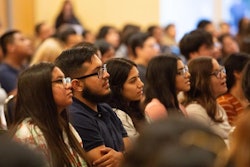A new California bill would require community colleges throughout the state to permit homeless students enrolled and in good standing to sleep in their vehicles in campus parking lots and parking structures overnight.
Assembly Bill 302 is sponsored by California Assemblyman Marc Berman, who says one in four California college students experience homelessness or housing insecurity.
According to results from a campus survey on student homelessness and housing insecurity, Cuesta College, located near San Luis Obispo, is ranked in the middle of state campuses that experience student homelessness.
“In the one week that it’s been out we’ve received close to a thousand responses from our students so it’s obviously an issue that’s resonating with them”, Mark Sanchez, vice president of student services at Cuesta College told CBS-affiliate station KEYT. “What we’re really trying to do is get a real solid handle on how many of our students are facing housing issues, housing insecurity or homelessness, and it will tailor our ability to craft support and resources to help them with those issues.”
Several Cuesta students acknowledge that there are students who “camp out” in their cars; some voiced their support for the new bill and for those who are struggling with homelessness.
“They took the effort and the time and their wanting to make something better in their life”, said Cuesta student Annie Schaefer, “they’re sacrificing just to be here and to go ahead and get an education so they wouldn’t be in that situation anymore.”
Shannon O’Connell, a student at Cuesta added: “Occasionally I do find that it’s disturbing and it needs to be dealt with.”
Other students noted finding affordable housing is difficult for most students.
“This is not a very affordable place to live,” said Cuesta student Veronic Perez, who commutes to campus from her home an hour and a half away. “Most of my friends have six or seven roommates, you know, they’ll share a room with two or three people.”
“What we can do is be a partner with our community-based resources, be a connection point to get students to access those community based resources,” Sanchez said.









